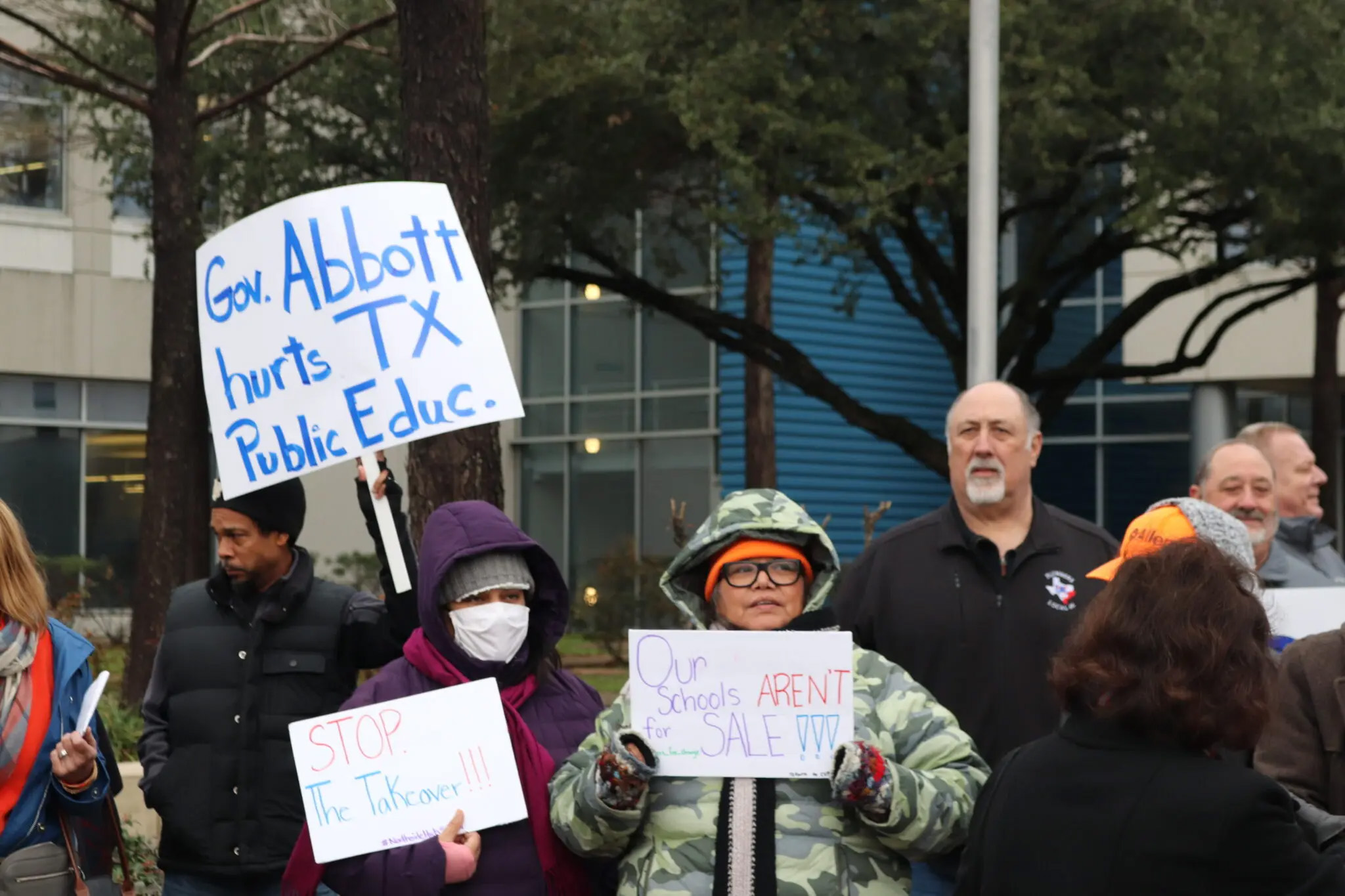The Texas Education Agency is expected to take over the Houston Independent School District on Thursday, when the superintendent and elected school board will be replaced by state-appointed managers.
The move comes in response to schools that have long failed to meet state standards, a school board that has been dysfunctional at times, and a special education department that has struggled to comply with federal law.
Until all of that changes, control of the state’s largest district lies not with Houston ISD voters, but with a group of state-appointed managers. Education Commissioner Mike Morath can replace them at any time, though a TEA spokesperson promised that authority “would only be exercised under the most extreme circumstances,” like a manager moving outside of the district or violating ethical standards or legal mandates.
The primary legal justification for the takeover was the year-after-year failure of one school to meet state standards. The new leadership is in place because of that shortfall, and it’s one of the challenges they’ll have to address.
Schools must meet state standards
In early April, students, staffers and parents across a handful of Houston ISD schools protested the takeover. At Wheatley High School in Fifth Ward, social studies teacher Donnie Walker mingled with the crowd of students.
He was worried about possible changes to Wheatley under the new superintendent and board of managers.
“What’s going to happen to Wheatley in the future? That’s still up for grabs,” Walker said. “But what I hope happens to Wheatley is that it stays the same, it continues thriving … people come in and see for themselves and stop having a bad perception based off of the past.”
Wheatley is at the heart of the takeover. It failed to meet state standards for many years in the leadup to 2019, when the TEA announced it would take over the district. That move was delayed in court until this year.
As Walker points out, students at Wheatley don’t have it easy. Hurricane Harvey flooded the area in 2017, and recovery took a long time.
“Oh, this area was hit really hard because it’s already economically disadvantaged,” he said. “So within the community, essentials like attendance, that was bad for us. Because certain students had to stay home, they had to tend after their parents, they had to tend after their siblings. So it was really difficult for a lot of these students to come back and learn with fidelity.”
Since 2019, Wheatley has met state standards. And Houston ISD received a B on TEA’s A-F ratings system.
“Houston ISD, as a system, continues to allow chronically low achievement in multiple schools,” education commissioner Mike Morath told Houston Public Media in March.
There were nine campuses in Houston ISD that failed to meet state standards in the 2021-22 school year, compared with more than 40 in the 2018-19 school year.
The new board will have to decide how to take on this challenge. In order for the takeover to end, the district must have no multi-year D or F-rated schools. That’s one of the three exit criteria.
The board has to implement procedures and conduct that focus on student outcomes
The new board also has to focus on student outcomes.
TEA uses a model called “Lone Star Governance” to measure that.
In April, some of the candidates for the Board of Managers gathered in the Houston ISD nutrition building for a two-day training on this model. The trainings weren’t open to the public, but Houston Public Media obtained audio.
Former TEA Deputy Commissioner of Governance A.J. Crabill led some of the sessions. His first words were repeated through the two-day training: “Student outcomes don’t change until adult behaviors change.”
The basic idea: all of the decisions the board makes should focus on what’s best for students.
“The role of the appointed board — their number one job — is to create the conditions for improving student outcomes by authentically representing the vision and values of the community,” Crabill told candidates. “That’s always gonna be the number one job, but an appointed board has an additional, secondary objective — and that is to create the conditions for the elected board to be wildly successful.”
This training pushed candidates to set data-driven goals, based on community input, and to let the superintendent carry them out.
For example, he said the board could set goals based on how students score on the STAAR exam. And he pushed them to set a higher bar – TEA actually considers students who “approach” grade level to have passed. Basically, students can be slightly behind and still pass the STAAR.
“Do not set goals based on the percentage of students who pass the STAAR,” he said. “My coaching to you is always going to set your goals based on what percentage of students met grade level or mastered grade level.”
Crabill told candidates to be open with the community about the goals they set — and to follow through.
“You have to be crystal clear about ‘here’s what you can expect,’ and then you will have to honor your word,” he said. “Because you show up in a trust deficit. The community has no reason to trust an appointed board — none whatsoever. It would be foolish to assume that trust will be freely given. It will have to be earned. And the moment you choose not to honor your word in any way in the slightest, you completely disrupt the team’s ability to access the goal.”
The elected school board already used the Lone Star Governance model. Trustees have set goals intended to improve outcomes for students with disabilities, to bump up standardized test scores in reading and math, and to ensure that graduates are prepared for college, careers or military service.
We don’t know who will be on the new board, and TEA hasn’t confirmed or denied rumors that former Dallas ISD superintendent and current charter network executive Mike Miles is the incoming superintendent. The new leaders will have until the end of June to approve next school year’s budget — but Crabill told Houston Public Media that he doesn’t expect any major changes to the district until they have a chance to actually listen to the community.
“They should stop and listen first,” he told Houston Public Media. “And then proceed only after having listened and take into account what they’ve heard.”
They’ll also need to understand the nitty gritty of district finances and policies.
“That learning curve is huge,” said Judith Cruz, one of the elected trustees who’s about to be replaced.
The Lone Star Governance training is more focused on leadership attitudes and high-level goal development than operational details. And there’s an exodus of high-level leadership at Houston ISD in the leadup to the takeover, so the new managers will lose a lot of institutional knowledge.
“The next level of management — a lot of support staff — I think is going to be scrambling to try to put things together and try to show the ropes of what’s happening,” Cruz said. “Because I don’t see how it could function otherwise.”
Celia Sims was one of the candidates for the Board of Managers. She worked in D.C. for many years and now runs a consulting firm focused on education and social services. She says the training helped her understand the role of the board — to set goals and let the superintendent carry them out.
“What your role is versus what the superintendent’s role is, and then accountability,” she said. “From what I understand of the criteria to (transition back to local control), that goal-setting is really important.”
According to a TEA spokesperson, a third-party Lone Star Governance coach will need to verify the new board’s adherence to the model. The Board of Managers must “achieve a Meets Focus score in the areas of Vision & Goals, Progress & Accountability, and Systems & Processes.”
Lindsey Pollock is a former Houston ISD principal and was a candidate for the Board of Managers. She thinks the takeover and Lone Star Governance doesn’t address root causes of poor outcomes for students, like lack of access to healthcare, nutrition, and affordable housing.
“The school cannot fix all of society’s struggles,” she said. “And yet somehow, as a society, we’ve demonized public schools. And we want school teachers and administrators to fix all the things that our elected officials refuse to acknowledge.”
This tension is on full display in the third exit criteria for Houston ISD: special education compliance.
The district has to comply with state and federal laws protecting students with disabilities
TEA has been tracking HISD special ed compliance for several years, and the agency appointed two conservators to improve compliance in late 2020. While there has been improvement, the district is still behind. Of 26 progress measures, the district is “on track” for only 9 as of the end of March, according to conservator reports obtained by Houston Public Media.













